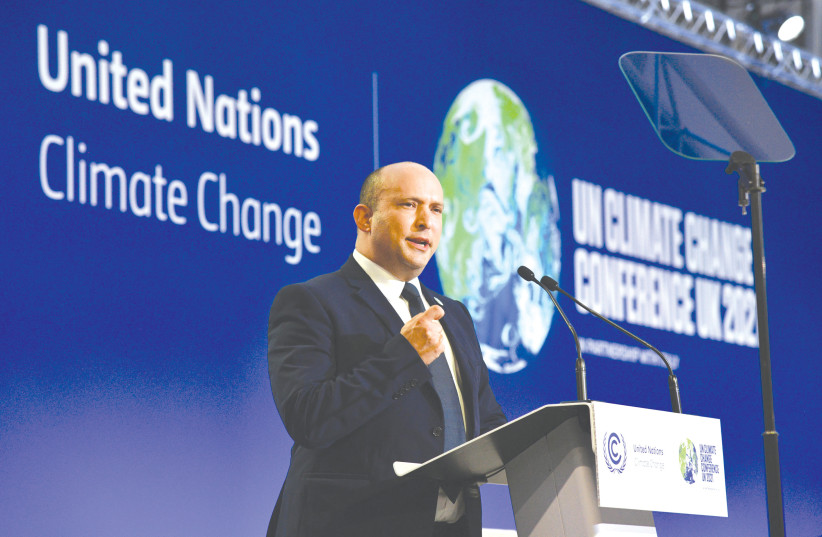The establishment of a national climate calculation center, which will make it possible to predict in detail the impact of global warming on our region, was approved by the government on Sunday.
The new center will be operated by the Meteorological Service of the Transport Ministry under the direction of a steering committee composed of the chief scientists of Ministries of Environmental Protection, Agriculture, Energy and Innovation, Science and Technology and the Water Authority.
Due to the need for accurate data to deal with the climate crisis and its far-reaching consequences, the ministries have decided to allocate NIS 20 million for the project over the next five years.
Climate change, they said, has far-reaching implications for all sectors of the economy – agriculture, the energy sector, transport, water and drainage basins, biological systems and ecosystems, the environment and even national resilience and security.
While the government is working as part of an international effort to try and curb climate change, it must at the same time be well prepared for the changes that will take place in the coming decades.
Government ministries map climate risks and build sectoral preparedness plans under the direction of the National Preparedness Administration at the Environmental Protection Ministry, but are required to base their actions and decisions on prevention, adaptation, in-depth research and scientific insights.
For detailed simulations, significant computing resources are required – namely, a “supercomputer” with thousands of processors and storage resources on a huge scale.
The climate calculation center will make it possible to strengthen climatic research and establish an open database of detailed climatic forecasts so as to create a proper knowledge infrastructure for decision-making and to deal with climate change in Israel.
The Middle East is heating up faster
The ministries said that Israel is in a region that is heating up faster than the world average and is very sensitive to climate change, partly due to the limited natural water resources and proximity to the desert strip.
Within such a small geographical area, there is a wide topographic and climatic range, requiring high-resolution simulations to accurately describe local meteorological processes and climate change on coastlines, mountain ranges, the Jordan Valley and the Arava.
In light of its experience and expertise in running climatic simulations on multi-processor computers, the Meteorological Service will be in charge of establishing and managing the infrastructure, but the infrastructure to be established will be open to all climate researchers in the government and in the universities.
In light of the high academic level of Israeli research, it is guaranteed that the national infrastructure that will be established will march Israel to the forefront of global research in the field, they added.
Since the simulations will be of the entire region around us, the open information base of the high-resolution forecasts could be used by all the countries in the region and promote the making of informed and coordinated decisions.
"We are in the midst of a tremendous move to advance environmental policy that includes the process of electrifying our transportation – from buses, through charging terminals to the heavy railway."
Transportation Minister Merav Michaeli
"My office prioritizes the treatment and prevention of the climate crisis, and I am glad we have partners and partners in the government who understand the importance of immediate action on the issue," said Transportation Minister Merav Michaeli.
"We are in the midst of a tremendous move to advance environmental policy that includes the process of electrifying our transportation – from buses, through charging terminals to the heavy railway, we have shifted government decisions to clean transportation and turned the pyramid into public and sustainable transportation. The good news in the approval of the establishment of the calculation center will promote the set of actions being taken for our environment, which will enable a better response to the climate crisis.”
“In an era of escalating climate crisis, the establishment of a climate calculation center is a necessary step,” said Environmental Protection Minister Tamar Zandberg.
“Accurate data on Israel’s situation and high level of analysis for formulating forecasts are critical tools for Israel’s coping with the climate crisis. With proper, data-based preparedness, we can reduce the level of risk, help populations and infrastructures at risk reduce their vulnerability and prevent suffering and damage to property. Simulations of pollutant dispersion and air quality, calculations of the prevalence of diseases and pests and promoting many issues that are at the core of the work of our ministry important for the protection of public and environmental health.”
“Global warming is a threat to the world that causes far-reaching changes in our living environment,” said Agriculture and Rural Development Minister Oded Forer.
“This is a great challenge, and we understand today more than ever how important it is to anticipate the next crisis and prepare for it in advance. Innovative methods of action today can help agriculture deal with the consequences of the climate crisis in the short and long term, and enable farmers to continue to provide fresh and healthful food to the population.”
“In recent years, my ministry has been leading clear steps and policies to address the climate crisis in the energy sector,” said Energy Minister Karin Elharrar.
“The establishment of the center is another step that will enable us to establish tools and solutions to address the climate crisis. In the future, the sea can be used for energy production. Beyond that, some of the climate impacts relate to the maritime space near Israel, and accurate assessments in this area that will be made in the future by the Israel Oceanographic and Limnological Research Institute are for both the coastal environment and the maritime space that can also be used for energy production.”
Orit Farkash-Hacohen, the minister of Innovation, Science and Technology, said this important decision to strengthen Israeli science and technology sets in motion the establishment of a significant computing force that will present accurate and detailed information on Israel’s unique climate challenges.
“These will strengthen the science and hi-tech industry in these fields and Israel’s international position on this issue.”
Meteorological Institute director Nir Stav said that “Israel is taking a leap in addressing the challenge of preparing for climate change, with a national computing infrastructure for climate research and establishing an open database of high-resolution climatic forecasts for us and our neighbors.”
Finally, Water Authority director Yehezkel Lifshitz said that his office has the responsibility to manage, operate, develop and regulate the water economy, while weighing future needs and examining the condition of water sources. It has long been working to reduce its use of natural water resources and use as much desalinated water as possible.

